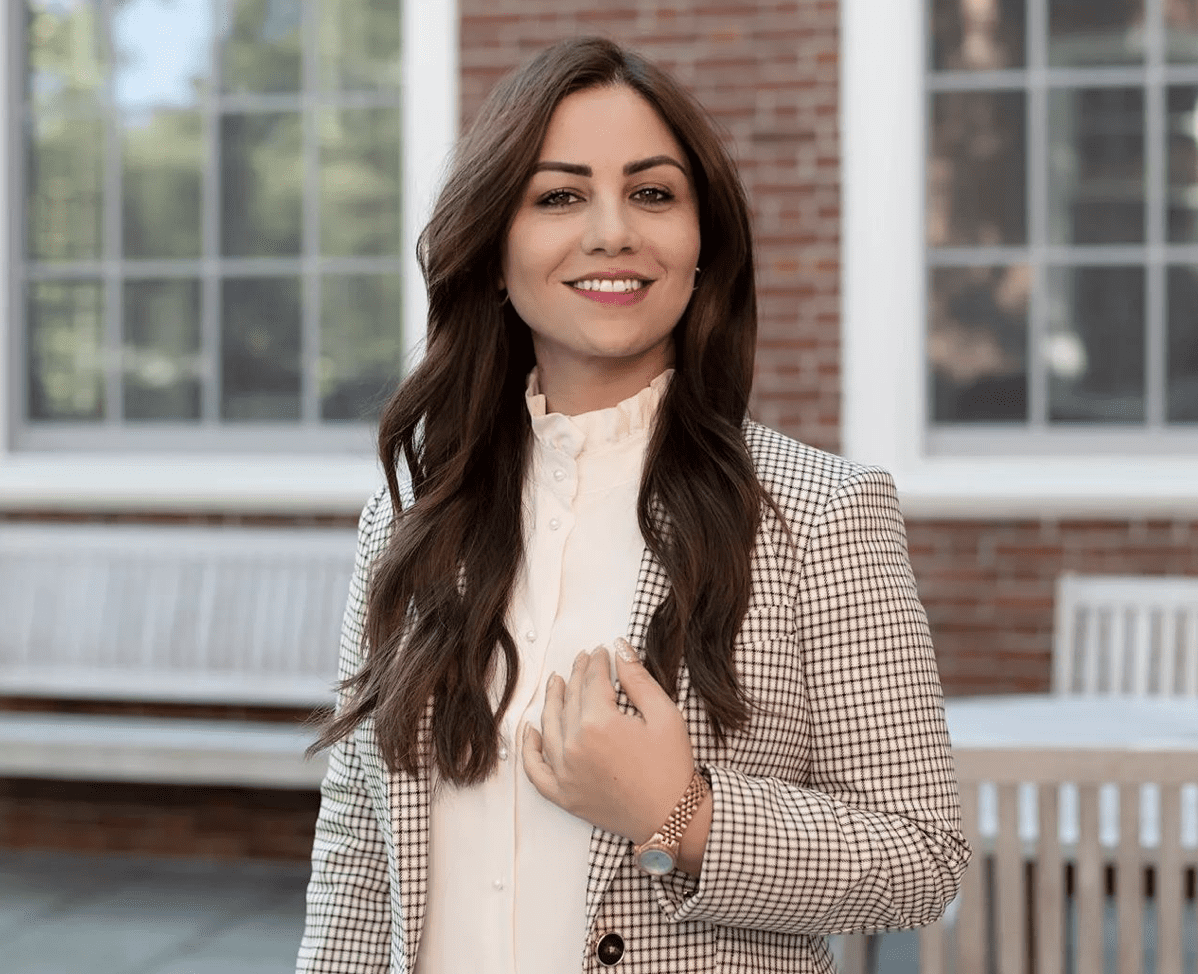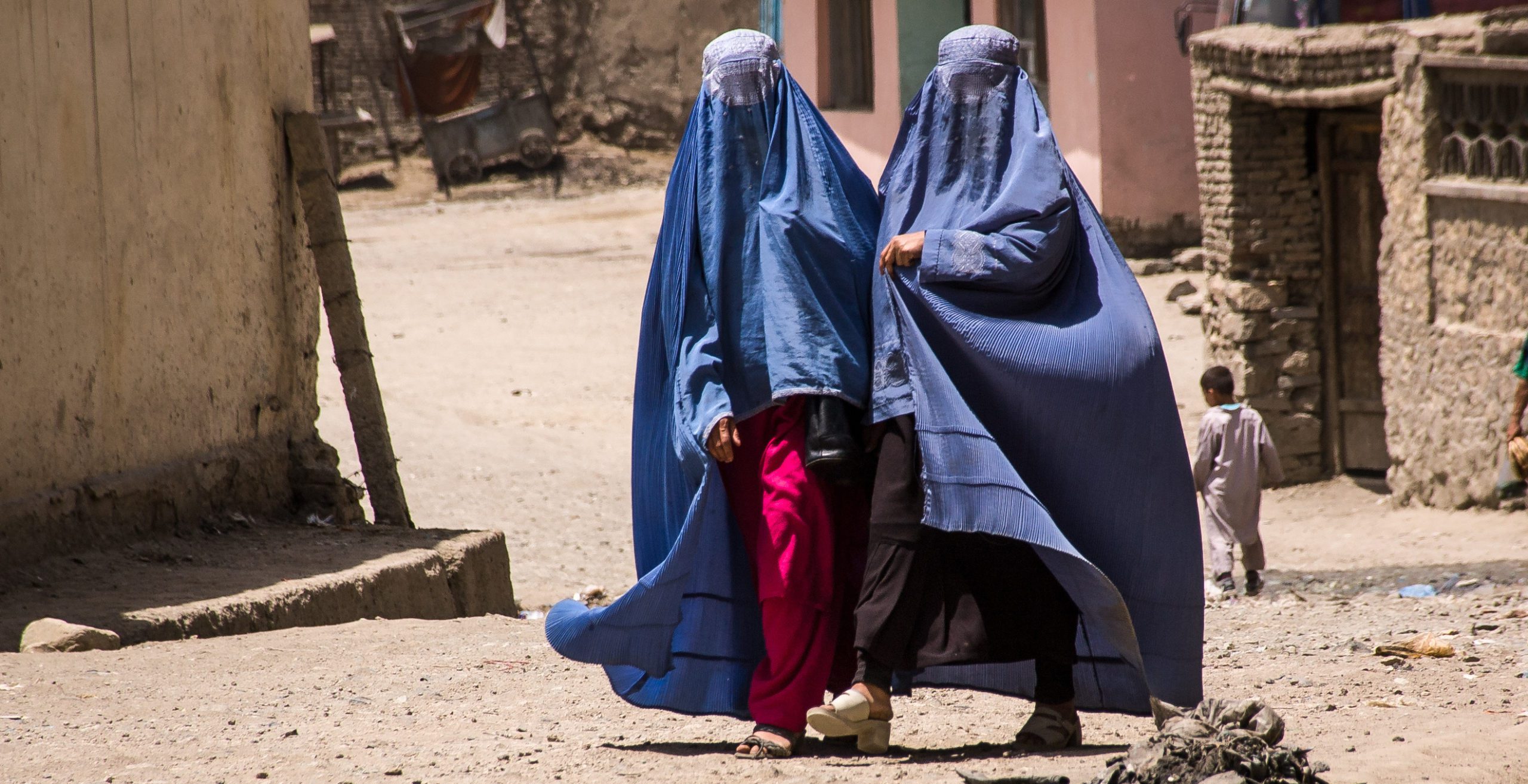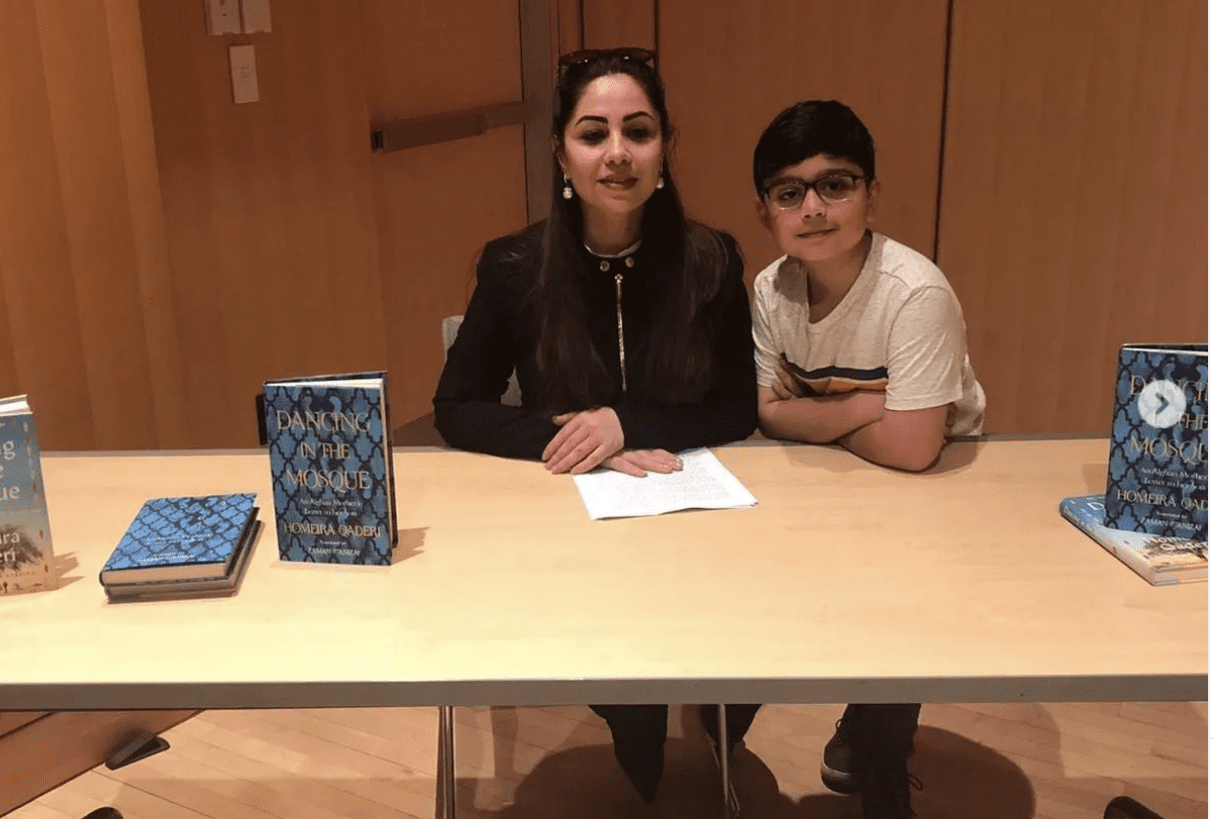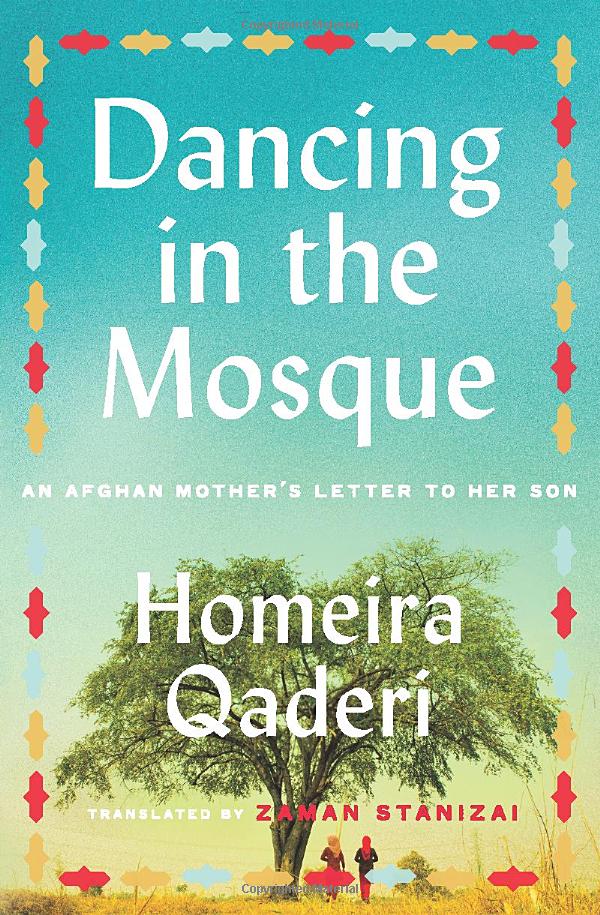Homeira Qaderi is an Afghan writer, activist, and educator and currently is a Radcliffe Fellow. She has written seven books in total, including Dancing in the Mosque: An Afghan Mother’s Letter to Her Son, which was excerpted by the New York Times and chosen by Kirkus Reviews as one of the best nonfiction books of 2020. This memoir, marked by courage and despair, tells the story of a son she left behind in Afghanistan. Before leaving Afghanistan, Qaderi taught at Gharjistan University, in Kabul, and worked as a senior advisor to both the minister of education and, earlier, the minister of labor, social affairs, martyrs, and the disabled. A lifelong human rights activist, Qaderi was awarded the Malalai Medal—Afghanistan’s highest civilian honor—for exceptional bravery by the President of Afghanistan. She spoke with the Mittal Institute ahead of her talk, “Fiction in Afghanistan” on Friday, November 11. Note her talk will be in Persian with summarized translation.

Homeira Qaderi.
Mittal Institute: Homeira, thank you for speaking to us about your work. In 2020 you released your powerful memoir, Dancing in the Mosque, which tells the story of your son, Siawash, who was snatched from your arms at 19 months old by your former husband. Can you talk to us about why you decided to write this book and share your personal experience under Taliban rule?
Homeira Qaderi: After Afghanistan was surrendered to the Taliban, the first question the foreign media asked me was why we didn’t fight for ourselves. I told them that they have neither read the stories of the battles we fight nor have they wanted to see the defense of the ideals we fight for.
My memoir is the story of an Afghan woman’s struggle to fight for the rights that she considers inherently her inalienable human rights. My human rights have nothing to do with the East or the West.
Every Afghan girl is a soldier on the battlefield of women’s rights she is born with. I have also fought this battle since—it seems forever. I have been defeated many times because laws are written for the benefit of men, because the culture is misogynistic, because traditions are strict, because… However, after each failure, I have risen and continued more confidently because I realized that the journey is long and the battle must be fought.
Every Afghan girl is a soldier on the battlefield of women’s rights she is born with. I have fought this battle since—it seems forever.
I wrote my memoir because I wasn’t sure I could get custody of my son. I wanted this book to be a reminder of my love for my son and a record of my struggle as a woman who wanted to honor my gender identity. I wanted my son to know that I love him, but I also respect my womanhood.
Through this book, I also wanted to show Afghan women the way and resilience of struggle. I wanted to pave the way for the struggle of other women.
Most of all I wanted to expose the myth that after the U.S. involvement in Afghanistan, every change in the country did not necessarily favor women; and that, contrary to the popularized world opinion, life for the women of Afghanistan was not fine and dandy, and the U.S. presence in supporting Afghan women’s rights has been the success story that some believe it to be.
I wrote my memoir to convey my message to those who want to know about Afghanistan that the real fighters in the field of human rights in Afghanistan are the Afghan women, charging ahead in their battle in litigation and human rights.
Mittal Institute: You say that “Mothering in Afghanistan amounts to running along the sharp edge of a sword.” Can you talk about some of the particular challenges mothers face under Taliban rule?
Homeira Qaderi: Presently, it is very difficult to be a woman in Afghanistan. It doesn’t matter what a woman’s role is – mother, sister, wife, or daughter.
Women in Afghanistan are suffering a lot. Women are completely excluded from society. They do not have the right to travel without a mahram, a legal guardian. The gates of the girls’ schools are closed. Employment rights for women are very low. In such distressed economic conditions, women are suffering. Out of desperation, they give in to forced arranged marriages. I lived in Herat during the Taliban era for five years from 1996 to 2001 and I know that the condition of women under the Taliban was deplorable.
The Taliban systematically and purposefully exclude and vanish women from society without the slightest remorse or any sense of accountability. So, I know that no woman in Afghanistan is in a good state. During the era of the republic, at least I, as a mother, was able to fight for my child. The gates of the courts were open to us. I did not need a mahram. I used to go out to work on my own, but now my mother is scared to even step outside the house for her daily walk.

Afghan women in burqas walking in the street in Kabul | Adobe.
Mittal Institute: Siawash was separated from you for nearly three years. You are now reunited, and he is 8 years old. Can you talk about that powerful reunion?
Homeira Qaderi: Well, women are not the only victims of the country’s misogynistic norms. Men are also harmed by inhumane laws. Siawash has also witnessed unpleasant situations. Our current relationship is strong. It is unbreakable, but Siawash continues to remind both of us of the first days together. Sometimes he feels ashamed that he has not been good to me. Sometimes he is angry that he did not know that his mother was alive. Sometimes he dreams that he is being taken away from me. We still remember the days when I had to go to court to extend the custody period.
These reminders are all painful. Siawash still needs time to go through all this. However, the good part of the story is that he has dozens of questions that he does not want all the answers from me. He wants to work for the women of Afghanistan in the future. He wants to end women’s suffering. Of course, we joke once in a while when I tease him telling him not to become like Khalilzad and end up betraying the women of Afghanistan. Because Siawash watches the news, he knows that Khalilzad negotiated with the Taliban and basically surrendered Afghanistan to them.

Homeira and Siwash at a book signing.
Mittal Institute: This is your seventh book, yet the first one that you translated into English from Dari Persian. Why did you decide to have this particular book translated?
Homeira Qaderi: All Afghans know what is happening to us, Afghan women. So, what was the need for me to keep repeating them? By writing my memoir, I wanted to open the door to the world outside of Afghanistan. I wanted the voice of Afghan women to have a global audience. I wanted the world to know that we have always been engaged in fighting for our rights.
Another reason is that writing memoirs in this way is not common in our culture. Usually, women are silent and it is a great shame to write about family and family memories, to write about love and hate. Even worse to write about divorce and separation. Women talking in this way is completely new. I did not think that this book would find any readers in Dari Persian. But when the book was published in English, it found its way and its place in Afghanistan, too. I saw that it is sold even on sidewalks. The new generation reads books in English.

Mittal Institute: This book has been called a “remarkable story of great strength, perseverance, and personal sacrifice by a woman selflessly working to advance the rights of women in her homeland of Afghanistan, women, and girls who yearn to be free.” What does it mean to you, to know that you are championing the rights of women under Taliban rule? And where do you find your strength?
Homeira Qaderi: Yes, this book is about the power of motherhood. In this book, I am not the victim. I believe that as long as a person fights, she is no longer a victim. Fighting in Afghanistan for women’s rights is a great and worthy cause. During my life in Afghanistan, I was more like a horse on a racetrack. There were obstacles in every direction I turned. Every path I chose was full of obstacles. Sometimes I run out of breath while running and crossing the obstacles. I have fallen on these obstacles many times. I am tired now, but I am not sad. I am victorious.
But I have not sought to become a hero with this book, being a hero is not a concern for me at all. My only concern is always to be able to pass through the challenge of obstacles. Getting to my child was crossing the highest obstacles.
But what choice did I have? Would the patriarchal society have mercy on me if I didn’t fight?
No, I have seen countless women who gave up. I know many women who grew old under this suppression. Did I want to go the same way? Never. I had to chart my own waters. Where did I get my strength from? Maybe from my fear? I did not want the patriarchal system to destroy me. I had to pull myself out of this well. Of course, writing has always been a therapist for me.
Mittal Institute: You have lived in a number of foreign countries since leaving Afghanistan – Iran, India and the U.S. Can you talk to us about the process of fleeing Afghanistan? What predicated you leaving the country?
Homeira Qaderi: Traveling is very productive, but immigration is hard. Even the birds that fly over the mountains, the plains, and the sea, want to return to their homes.
It’s great that I’ve lived in different countries, but I miss home more and more. Do you know how sad it makes me when I see that other people in the world have even some of their childhood books in their libraries? I have lost my library many times. I’ve let go of everyone I’ve ever loved.
Do you know how sad it makes me when I see that other people in the world have even some of their childhood books in their libraries? I have lost my library many times. I’ve let go of everyone I’ve ever loved.
The last time I left my family was on the evening of August 27, 2021. I left my whole family. I still remember my father’s sad eyes when he said goodbye.
I resisted until the last moment. I wanted to stay, but when the house-to-house search began, my father asked me to leave Afghanistan. If something happened to me, he could not do anything for me
Mittal Institute: As a Radcliffe Fellow, you’re working on a novel, inspired largely by your own experiences, with the working title “Tell Me Everything.” Can you give us a brief overview of this forthcoming book?
Homeira Qaderi: My new book, which I am currently working on, is the story of Rokhshana, who was abducted from Afghanistan and taken to the Soviet Union during the Soviet invasion of Afghanistan. She was supposed to be taken to a communist indoctrination camp with other kidnapped Afghan children. But after the collapse of the Soviet Union, her uncle finds locates Rokhshana and brings her back to Afghanistan.
I saw the real Rokhshana in Herat when she came to our house to be treated by my uncle who was a doctor. At that time Rokhshana was seventeen or eighteen years old and it was the bad days under the Taliban. I was in contact with Rokhshana for some time after that, but I lost contact with her. This is the book of her life.
Mittal Institute: What has being at Harvard meant to you?
Homeira Qaderi: I was supposed to work on my book in peace at Harvard, but during this time my brother was arrested and tortured. My father suffered a stroke after being humiliated by the Taliban. He is undergoing surgery these days. My family was completely destroyed in Afghanistan. We are a cultured family. My father is a professor of literature. I’m having a hard time in my beautiful office at Harvard concentrating on my work. But Harvard has given me the opportunity to talk to many friends I have met here. I try to be able to live in both cities Cambridge and Kabul.
I hope I can be the voice of Afghan women here as much as I can. Although I know that the world has abandoned Afghanistan and Afghan women, I wish my pen can have the power to change the miserable lives of Afghan women these days.
I hope I can be the voice of Afghan women here as much as I can. Although I know that the world has abandoned Afghanistan and Afghan women, I wish my pen can have the power to change the miserable lives of Afghan women these days.
I have kept in touch with many young people through the story writing classes I teach online. Harvard gives me hope and I project this hope like a light to illumine the youth of my country.
